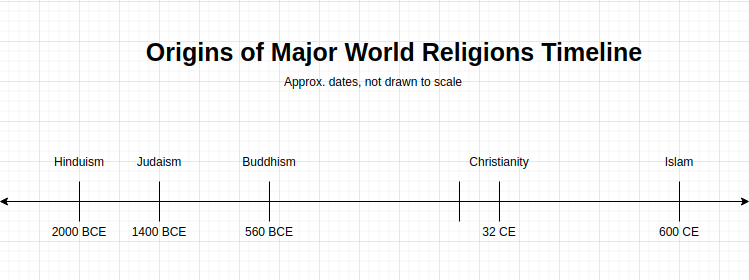In the name of God
Countless people have sacrificed their lives, in the name of God.
Countless people have murdered, in the name of God.
Women are raped, in the name of God.
Institutions are built and destroyed, in the name of God.
The most evil people in the world, actually believed that they were morally correct and that there was nothing wrong with them. This begs the question, what does it mean to be morally right? What is right and what is wrong? Who gets to decide what is right and what is wrong? What is God? What is religion? Why do people believe in different God(s)/religions? Does God even exist?
I’m going to attempt to answer these questions and its going to involve a lot of history, anthropology, philosophy, politics, math and of course, blasphemy. So hang tight.
Religion and God
About 10,000 years ago, the invention of agriculture transformed many human societies from a hunter-gatherer lifestyle to a sedentary lifestyle. Since humans didn’t need to take up dangerous conquests in search of food, this led to a huge population explosion. The size of a society grew rapidly from a few hundreds to thousands, with foraging bands settling down to build cities and empires. While earlier, smaller tribes did possess supernatural beliefs, these concepts weren’t sophisticated enough to justify a central authority or just possession/transfer of power and wealth. This is where organized religion was born as a means to provide social and economic stablity through:
- Justifying a central authority
- A moral code of conduct for unrelated individuals to peacefully cooperate with each other
- A central force or cause to unify groups and avoid mass murder.
For any organized religion to exist, they’d have to first define God.
What is God?
A unifying central authority would probably have the following characteristics:
- God is a human - because dogs, cats and rocks don’t speak our language.
- God is a “He” - because patriarchy; No way chauvinist men would listen to women.
- God is indisputable - he is supernatural, eternal, creator of the universe and the all supreme moral authority.
Now that God has been conceptualized, time to define morality. What is right and what is wrong. The logical way to go about this is to create a religious text(scripture), a single source of truth, that defines and explains the nitty-gritty of morality. Also, because it was the technology of the time making it easy for people to communicate and propagate knowledge over generations.
Constitution:state :: religious text:religion
But why would anybody take a piece of text seriously until they have established the credibility of the author? Hence, every major religious text starts with establishing the fact that God is almighty and everything written in the following scripture is a word of God.
- Islam - Quran was orally revealed by God to the final prophet, Muhammad, through the archangel Gabriel (Jibril), incrementally over a period of some 23 years, beginning in the month of Ramadan
-
Christianity - Bible is the word of God. Any mistakes made in the bible are errors in translations by humans.
“All Scripture is God-breathed and is useful for teaching, rebuking, correcting and training in righteousness, so that the servant of God may be thoroughly equipped for every good work.”
2 Timothy 3:16-17
- Hinduism - Bhagvad Gita is a written document of conversation between Krishna(God) and his disciple, Arjuna.
Now, lets dive into the logic behind religion.
Logic
Logic is the study of truth, or broadly speaking, principles of correct reasoning. In our case, we can consider a religious text to be a system of truths and try to analyze how /where this system of truth is broken. But before that, quick aside:
Statement 1: A is the father of B
Statement 2: B is the father of C
Statement 3: A is the grandfather of C
Given that statements 1 and 2 are true, we can logically conclude that statement 3 is also true. In the domain of logic, statements 1 and 2 are called axioms(a statement or proposition which is regarded as being established, accepted, or self-evidently true) and statement 3 is called a theorem(a statement that is logically deduced based on an initial set of axioms).
Every religion(system of truth) is spawned from the following set of axioms:
Axiom 1 > p: God exists
Axiom 2 > q: God always speaks the truth
Axiom 3 > r: Everything mentioned in religion R is a word of God
Let s be every statement mentioned in the religion(or religious text) R
Hence, by induction we get:
Theorem: For all s: (p^q^r) ⇒ s ;
In other words, if you believe that:
- God exists, and
- God always speaks the truth, and
- Everything mentioned in the religious text is a word of God then
Everything mentioned in the religious text is universal truth.
Now, you can go on and write something extremely bizarre within that body of text and people will buy it, in the name of God.
Problems with religion
As with any proof in any logical system, if the axioms are doubted, then the conclusions can be doubted. Or, if there are gaps in the system or set of axioms, then the entire body of text can be refuted. What all possible arguments could exist?
- Axiom 1 is false: God doesn’t exist. You get atheists.
- Axiom 2 is false: God doesn’t always speak the truth. He’s actually a programmer and we are just stupid programs, following stupid rules in God’s metaverse.
- Axiom 3 is false: Religion is a man made construct and not the word of God. You get SBNRs( Spiritual But Not Religious).
One true God
Notice, that the above set of axioms are incomplete.
Axiom 4 > There’s only one true God
Since nobody can prove the existence of God, without this axiom, anybody can theoretically start a religion. Hence, this loophole led to multiple religions being spawned at different points of time and geographies, either due to lack of competition or the previous religion becoming orthodox. Extrapolate this to modern times and we see religious wars in the name of “one true God”. Sigh.

The Death of Socrates
Islam did try and rectify this mistake by introducing the verse:
”La ilaha illa Allah” - There’s no God but Allah
But, alas, it was too late. Multiple major religions had already been established before it, and religions being antifragile, even religious wars and forced conversions couldn’t shake people’s faith. Another interesting thing to notice is that no major world religion has been created after Islam. Probably because of axiom 4? Of course, correlation ≠ causation, so I’ll leave you to it.

Fuck Logic
When the whole world becomes so convoluted, there comes a point where you find solace in nihilism. Nihilists reject all notions of logic. They find the entire exercise of defining morality and deciding right or wrong completely pointless. Zen Buddhists are OG nihilists, and develop the discipline of not believing in anything by studying Mu Koans.
Mu Koans are complete brain farts and I should probably discuss this in a separate blog.
-—-
What started off as a system to unite humans, ended up dividing us. This happened due to problems with logic as discussed above. Religion has become a necessary evil.
We can’t expect the uninitiated to grasp everything that I have mentioned above, but a little bit of common sense would take us a long way.
